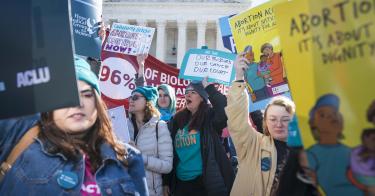On Wednesday, the Supreme Court heard oral arguments for June Medical Services v. Russo, a case involving a challenge to a Louisiana law that requires abortionists to hold admitting privileges at a local hospital—the same requirement that doctors at ambulatory surgical centers must meet.
The case is significant because, besides the question of whether abortionists may be exempt from a standard that applies to other providers, the court will explore a question of third-party standing. In other words, can abortionists pursue a lawsuit on behalf of women seeking abortions rather than the women pursuing legal action themselves?
For more than 30 years, abortion jurisprudence has largely allowed abortionists to claim to represent the interests of women seeking abortions. But women can challenge abortion regulations for themselves, and the court will now have the chance to determine whether the status quo is practical.
After all, particularly given the specifics of the June Medical Services case, the interests of abortionists and the women the abortionists claim to act on behalf of are not aligned. Rather, they are in direct conflict with one another.
Louisiana passed Act 620, championed by State Sen. Katrina Jackson (a Democrat), in response to well-documented substandard and shoddy practices of the state’s abortion industry. The law protects women by requiring that an abortionist obtain admitting privileges at a local hospital, which ensures that a woman will have continuity of care in the event that she experiences complications from an abortion. Holding admitting privileges also provides an added layer of confidence in a healthcare practitioner’s competence to provide care.
In Whole Woman’s Health v. Hellerstedt, the Supreme Court struck down a Texas law that, among other provisions, required that abortionists obtain admitting privileges. But the facts and legislative record in Louisiana are different, and the court can look to the specific practices that led state legislators to determine how best to protect women in their state.
Unfortunately, the Louisiana abortion industry’s track record is rife with deficiencies that jeopardize women’s health and safety. From botched abortions that led to life-threatening complications and the failure to report instances of women being harmed, intentionally destroying medical records to failing basic sanitary measures, the Louisiana abortion industry has repeatedly failed women.
June Medical Services has a troubling history of violations. It has “been cited 13 times since 2004, including for … reusing single-use equipment, allowing noncertified individuals to administer narcotics, failure to monitor patients’ vital signs during abortions, and failing to meet reporting requirements [or] maintain a sterile environment.” Other Louisiana clinics have been cited for similar violations—as well as violations such as performing abortions on minors without parental consent and failure to ensure informed consent.
Furthermore, Louisiana abortion facilities “do not appear to undertake any review of a provider’s competency” beyond checking that he or she has a current medical license. Unlike hospitals, the abortion clinics “do not even appear to perform criminal background checks.” This system led to June Medical Services allowing an ophthalmologist and a radiologist to perform abortions at their facility.
In other instances, abortion facilities contracted with abortionists who “engaged in unprofessional conduct” that endangered a woman’s life, according to the Louisiana Board of Medical Examiners. Another abortionist released a woman from his care despite the fact that “he suspected the abortion to be incomplete.” Following ensuing complications, the woman had an emergency hysterectomy, depriving her of her reproductive capacity. The Board of Medical Examiners found that the abortionist had “grossly mismanaged” the woman’s case and that her outcome was the result of his “medical incompetency.”
Requiring abortionists to obtain admitting privileges protects patients by providing them with continuity of care in the event of complications. But beyond that, it provides accountability because an applicant’s competency and track record are taken into account during the privileging process. Though an abortion clinic may fail to screen for competency, a hospital’s review can protect women from encountering an incompetent doctor.
In challenging Act 620, the Louisiana abortion industry is claiming to represent the interests of women while simultaneously seeking to do away with measures that protect those women’s safety. People would be rightfully disturbed if, for example, their children's pediatricians sued the state on their patients' “behalf” to strike down standard safety measures.
Why should abortionists be exempt from a standard that other doctors are held to? Why should they receive special treatment and in the process jeopardize women’s health and well-being?
Louisiana acted to prioritize women’s health over the abortion industry’s business interests. Abortion is a serious, life-altering procedure. Abortionists should not be able to claim to represent women’s best interests while simultaneously seeking to eliminate protections for the women they claim to speak for.
If women want to challenge abortion regulations, they are free to do so. The court shouldn’t allow the self-serving abortion industry to challenge laws “on behalf of” the very people the laws are designed to protect.
This piece originally appeared in the Washington Examiner




